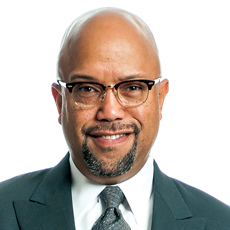
Long-term care providers and their lobbyists are “completely and totally” focused on dealing with the coronavirus pandemic, regardless of the presidential election results, a top association leader assured Friday.
“Everything is seen through that lens,” Clifton Porter II, the senior vice president of governmental affairs for the American Health Care Association, said in an interview with McKnight’s Long-Term Care News.
“We have to unite around the common enemy,” he said about the virus that has claimed as many as 80,000 U.S. nursing home lives. “Whether Democrat or Republican, in the House or in the Senate, the real task here is to get folks to maintain focus. It’s not the operators, not our staff. The enemy’s COVID. We need all the tools in the toolbox for this fight.”
Porter said that if president-elect Joe Biden’s projected victory holds up, extra effort is going to be needed to maintain political continuity.
“We need the same support from a President Biden as President Trump,” he declared. AHCA will remain joined with other associations across the healthcare spectrum to push for a $100 billion healthcare fund.
“We don’t want to lose sight of the fact we’ve had a significant amount of support from the Trump administration and we appreciate everyone, from Congress to the president,” Porter explained.
He made it clear that long-term care leaders were prepared to work with either party, just as they are every election cycle.
“It’s just what you do,” Porter noted. “We did it four years ago and we did it eight years ago. Each president has a different approach, so I’m not going to make assumptions. We’ll let them know out of the gate that we’ve been at the center of the storm and need to be part of the solution.”
If Biden wins, “we will engage immediately and also work feverishly to ensure that we get a package in a lame duck session,” Porter emphasized.
He noted that Senate Majority Leader Mitch McConnell’s recently stated willingness to pursue a relief package over the next two months is pivotal. Porter said that Trump and House Speaker Nancy Pelosi (D-CA) also have expressed hopes of getting one done.
“We’ve got the three main folks ready to rock and roll,” Porter said optimistically.
“There will be other issues,” he added, “but in some way, they’re all tangentially connected to COVID.”
Post-stimulus work plans
Porter said operators have some clear priorities after a new stimulus deal is struck. Workforce issues remain at the top of the list.
“We’re going to have to ensure we’ve got the people to provide the care and services needed,” he said. The registered nurse supply is paramount, but that has been slowed in recent years by a shortage of faculty at nursing schools, he explained.
Next is a need to make sure there is “sufficient PPE in every nursing home in America,” with a suitable supply on standby at all times, ready to be deployed.
“Fundamentally, we have to solve the supply chain issues so we never are in a situation where demand overruns supply again. It wasn’t the issue of PPE where they didn’t have the money to buy it,” he explained. “Folks were spending four times the price to get it. We need it to save staff and patient lives. But at the end of the day [early in the pandemic], it was not there to be had. That’s a core, underlying issue of working with the government.”
An “obviously ongoing” need also will be to have access to sufficient COVID-19 testing, Porter added. “COVID’s not going away. We can vaccinate, but we need the capacity to test to prevent the virus from getting into our centers.”
He said another “key question” is how to modernize facilities’ aging physical plants. Many are 30 years or older, compelling a need for “a real discussion.”
“We’re not going to lose sight of reimbursement, either,” he offered. “That remains a pernicious concern. We’ll see which facilities have been most impacted by COVID, and which ones weren’t. We have to have competitive wages to attract staff, and a lot of that is written by reimbursement rates.
Looking up
Important lessons have already been learned. Although the virus is currently not under control around the country, there is some reason for hope, Porter said.
“Once a vaccine is out and works, that’s when we know we’re climbing out of this hole,” he said. “The amount of spread in facilities is [now] significantly less than the first outbreak. We’re getting better at managing isolation, and there’s more PPE. We have more tools and that’s making a difference.
“We’re all victims of COVID — the patients, the staff, the economy,” he added. “There will be folks who want to point a finger. We’re accustomed to that. When the finger’s pointed, we’re going to point to COVID and our response will be let’s deal with the real enemy here and work together so this never happens again.”




